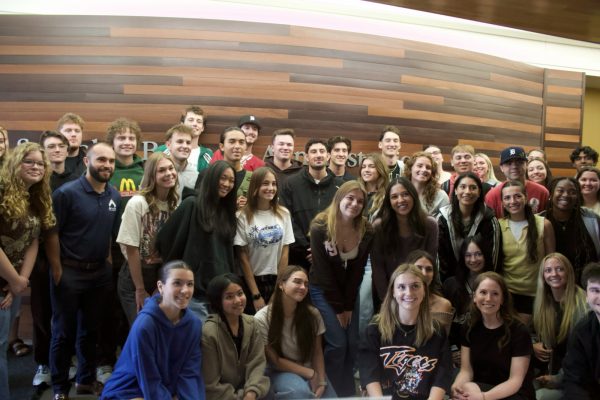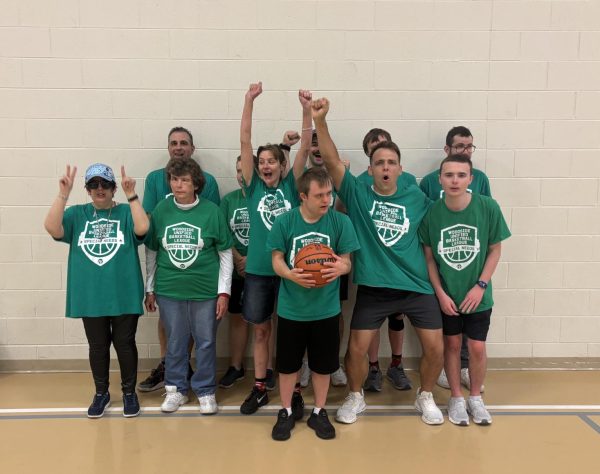Joining the ranks of worldwide green initiatives
As the nation becomes more concerned with being environmentally friendly, Oakland University is moving towards being a “greener” campus.
Richard Fekel, director of the Oakland Center, says OU is working to catch up to other state universities in terms of recycling.
“I think Oakland’s been a little slower possibly than some other campuses,” he said.
Fekel says other universities have educational departments more directly involved in projects that combine teaching and environmental strategies. He cited the University of Michigan’s expansive sustainability program as a model for campuses across the state.
“I think we could do a lot more recycling and support more sustainability initiatives but it takes money and staff,” he said. “Some campuses have made sustainability a top priority with financial and top-down support.”
One of the university’s biggest obstacles is a fragmentation caused by individual recycling programs between buildings.
“My hope is, before too long, that we get a campuswide organized approach to recycling,” he said.
The OC and housing department tried to taking a leadership role in developing a program, he said, adding that more unity across campus would help further green efforts.
“I think we’re getting there,” he said. “It’s just that everyone’s sort of doing their own thing right now.”
However, Fekel said that many projects involving energy conservation are in place, and he is always looking at new ways to improve the OC, including more hydration stations and eco-friendly food services.
Oakland (recycling) Center
The OC’s environmental efforts started in 1997 with cardboard recycling.
“The cardboard was coming from a lot of the packaged things from our food service operator as well as the bookstore, so we bought a huge cardboard bailer,” Fekel said. “I don’t know how many tons of cardboard we’ve saved from going into the landfill, but it’s an enormous amount.”
Since then, the university has expanded its recycling to include such items as office paper, toner and printer cartridges, batteries and fluorescent light bulbs.
To reduce plastic bottles and other recyclable materials from going into a landfill, the university has many recycling containers throughout campus for student use.
Freshman Ashley Monticciolo said the recycling bins are beneficial to the environment and keeping the campus clean.
“I’ve noticed that they have recycling bins in all the rooms and around campus,” she said. “Most people dispose of their plastic bottles and everything is kept up nicely.”
Fekel wants to expand the OC’s use of green cleaning supplies, although he said that finding cost-effective organic products with the same cleaning capabilities is a challenge.
Most of the windows in the OC have been replaced with double-pane windows, which helps save on heating and cooling costs. There are plans to replace more, he said.
The hydration stations
In the past few years, some of the campus’s older drinking fountains have been experiencing mechanical problems. When one OC drinking fountain in particular was in need of replacement, Fekel suggested a hydration station.
“You could think that possibly every time somebody refills a bottle, it might have saved a bottle from going into the landfill,” Fekel said.
Since then, hydration stations have been placed in both North Foundation Hall and Kresge Library, while another is in the basement of the OC. Fekel said he hopes hydration stations will become a campuswide standard and replace broken water fountains.
Communication and journalism student Christina Venditti, a junior, uses the OC hydration stations and said the university should install more.
“I think the hydration stations are really convenient,” she said. “I can buy a water bottle or bring one from home and refill it a few times before recycling it.”
Despite the success of the eco-friendly hydration stations, Fekel said there are no plans to stop the sale of plastic water bottles in the OC.
Good eats
Environmentally conscious students looking for on-campus dining can visit the OC’s Pioneer Food Court.
Chartwells, the company that operates the Pioneer Food Court and Vandenberg Dining Hall, has improved its green efforts, including:
– Composting excess food.
– Working on reinstating a mug-refill program to cut down on the use of dis posable cups.
– Donating leftover food to Forgotten Harvest, an organization working to end hunger in the Detroit metro area.
“If there is leftover food, Forgotten Harvest will come over and pick it up,” Fekel said. “It’s a nice way to give back to the community.”
In addition to Chartwells’ efforts, the OC also serves Certified Fair Trade organic coffee in the Pioneer Food Court, as does Caribou Coffee in Café O’Bears.





